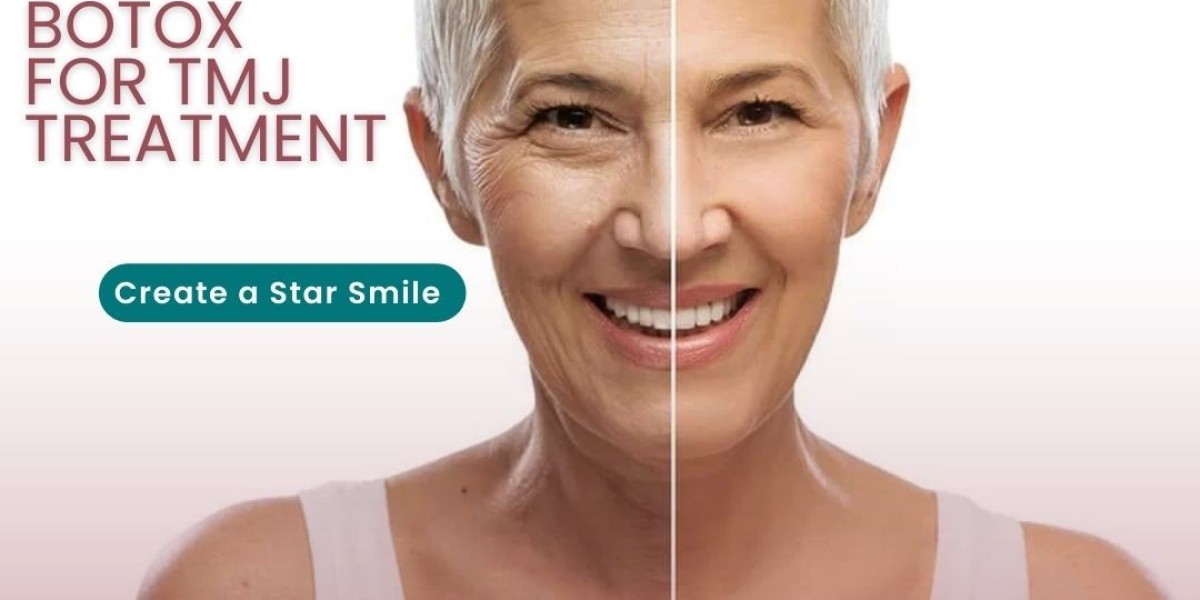Are you tired of living with constant jaw pain and discomfort? Look no further! At Tatum Dentistry, we have a groundbreaking solution to help you unlock the benefits and regain control of your oral health. Introducing Botox for TMJ, a safe and effective treatment that can provide long-lasting relief from jaw pain and improve your overall well-being. TMJ disorder, or temporomandibular joint disorder, affects millions of people worldwide, causing symptoms such as jaw pain, headaches, and difficulty in opening or closing the mouth. Our skilled team of experts at Tatum Dentistry understands the impact that TMJ can have on your daily life, which is why we have incorporated Botox as an innovative treatment option.
Understanding TMJ and its impact on oral health
Temporomandibular joint disorder, commonly referred to as TMJ, is a condition that affects the jaw joint and the muscles surrounding it. It is estimated that over 10 million people in the United States alone suffer from TMJ. The temporomandibular joint acts as a hinge, connecting the jawbone to the skull. When this joint becomes inflamed or damaged, it can lead to a range of symptoms that can significantly impact oral health and overall well-being.
Individuals with TMJ often experience chronic jaw pain, headaches, and difficulty in fully opening or closing their mouths. These symptoms can make simple tasks such as eating, speaking, or even yawning incredibly painful and challenging. In severe cases, TMJ can even lead to the development of other oral health issues, such as teeth grinding, worn-down teeth, and misalignment of the jaw.
What is Botox and how does it work for TMJ?
Botox, short for Botulinum toxin, is a naturally occurring protein produced by the bacterium Clostridium botulinum. While it is commonly known for its cosmetic use in reducing the appearance of wrinkles, Botox has also been proven to be an effective treatment for various medical conditions, including TMJ.
When used for TMJ, Botox works by temporarily paralyzing the muscles responsible for causing jaw pain and discomfort. By blocking the nerve signals that trigger muscle contractions, Botox helps to relax the muscles and alleviate the tension in the jaw joint. This not only provides immediate relief from pain but also helps to prevent further damage to the joint and surrounding tissues.
It is important to note that Botox treatment for TMJ is a non-surgical treatment option. Unlike traditional surgical approaches, Botox injections are minimally invasive and require no downtime for recovery. This makes it a convenient and accessible solution for individuals seeking relief from TMJ symptoms without the need for extensive procedures.
The benefits of using Botox for TMJ
The use of Botox treatment for TMJ offers a range of benefits that make it an attractive treatment option for individuals suffering from jaw pain and discomfort. Here are some of the key advantages of using Botox for TMJ:
1. Pain relief: Botox injections effectively target the muscles responsible for TMJ pain, providing rapid and long-lasting relief. Many individuals experience a significant reduction in pain within days of receiving the treatment.
2. Improved oral function: By relaxing the muscles in the jaw, Botox helps to restore normal oral function, allowing individuals to open and close their mouths with ease. This makes everyday activities such as eating and speaking much more comfortable.
3. Reduced teeth grinding: TMJ often leads to teeth grinding, which can cause further damage to the teeth and jaw joints. Botox injections can help to reduce teeth grinding by relaxing the muscles responsible for this behavior, protecting the teeth from unnecessary wear and tear.
4. Non-surgical approach: Unlike surgical options for TMJ treatment, Botox injections are minimally invasive and require no incisions or sutures. This means no scarring, minimal discomfort, and no downtime for recovery.
5. Long-lasting results: While the effects are not permanent, they can last for several months, providing individuals with an extended period of relief from jaw pain and discomfort. Regular maintenance injections can help to ensure continued benefits.
Common symptoms of TMJ and how Botox can provide relief
TMJ can manifest in a variety of symptoms, each of which can significantly impact an individual's quality of life. Here are some common symptoms of TMJ and how Botox injections can provide relief:
1. Jaw pain: One of the most prevalent symptoms of TMJ is jaw pain, which can range from mild discomfort to intense, throbbing pain. Botox injections can help to alleviate this pain by relaxing the muscles responsible for the tension and inflammation in the jaw joint.
2. Headaches: TMJ often leads to frequent headaches, including tension headaches and migraines. Botox injections can help to reduce the frequency and intensity of these headaches by targeting the muscles that contribute to their occurrence.
3. Difficulty in opening and closing the mouth: TMJ can make simple tasks such as opening and closing the mouth incredibly challenging. Botox injections help to relax the muscles responsible for restricting jaw movement, allowing for improved oral function and increased range of motion.
4. Clicking or popping sounds in the jaw: Many individuals with TMJ experience clicking or popping sounds when they open or close their mouths. Botox injections can help to reduce these sounds by relaxing the muscles and reducing the friction in the jaw joint.
The process of receiving Botox treatment for TMJ at Tatum Dentistry
At Tatum Dentistry, we strive to provide our patients with the highest quality of care and innovative treatment options. When it comes to Botox for TMJ, our team of experts follows a comprehensive process to ensure optimal results and patient satisfaction.
1. Consultation: The first step in receiving Botox treatment for TMJ at Tatum Dentistry is to schedule a consultation with one of our experienced dentists. During this consultation, your dentist will evaluate your symptoms, medical history, and oral health to determine if Botox is the right treatment option for you.
2. Treatment planning: Once it is determined that Botox is suitable for your condition, your dentist will create a personalized treatment plan tailored to your specific needs. This plan will outline the number of injections required, the targeted areas, and the expected outcomes.
3. Botox injections: On the day of your treatment, your dentist will administer the Botox injections using ultra-fine needles. The injections are typically well-tolerated and cause minimal discomfort. The entire process usually takes less than an hour, allowing you to resume your daily activities immediately afterward.
4. Follow-up care: After receiving Botox injections for TMJ, your dentist will provide you with detailed instructions on post-treatment care. This may include avoiding certain foods or activities that could strain the jaw muscles. Your dentist may also schedule follow-up appointments to monitor your progress and make any necessary adjustments to your treatment plan.
By following this comprehensive process, Tatum Dentistry ensures that each patient receives the highest standard of care and achieves optimal results with Botox for TMJ.
How Botox for TMJ fits into a comprehensive oral health plan
While Botox Treatment for TMJ can provide significant relief from jaw pain and discomfort, it is important to note that it is just one component of a comprehensive oral health plan. At Tatum Dentistry, we believe in taking a holistic approach to oral health, which includes addressing the underlying causes of TMJ and incorporating other treatments and therapies as necessary.
For individuals with TMJ, a comprehensive oral health plan may include:
1. Botox for TMJ: As discussed earlier, Botox injections can provide immediate relief from TMJ symptoms and improve oral function. Regular maintenance injections may be required to sustain the benefits.
2. Oral splints or mouthguards: These devices can help to alleviate TMJ symptoms by reducing teeth grinding and providing support to the jaw joint. Your dentist may recommend the use of splints or mouthguards in conjunction with Botox treatment.
3. Physical therapy: In some cases, TMJ may be caused or exacerbated by muscle imbalances or poor posture. Physical therapy exercises can help to strengthen the jaw muscles, improve alignment, and reduce tension in the jaw joint.
4. Stress management techniques: Stress and anxiety can contribute to TMJ symptoms. Learning stress management techniques, such as relaxation exercises or counseling, can help to reduce tension in the jaw and alleviate TMJ-related pain.
Other treatments and therapies available for TMJ at Tatum Dentistry
At Tatum Dentistry, we offer a range of other treatments and therapies for TMJ to ensure that each patient receives the most appropriate and personalized care.
1. Medications: In some cases, medications such as muscle relaxants or pain relievers may be prescribed to manage TMJ symptoms. These medications can help to reduce muscle tension, alleviate pain, and improve oral function.
2. Trigger point injections: Trigger point injections involve the precise injection of medication into specific trigger points in the jaw muscles. This can provide targeted relief from muscle tension and pain associated with TMJ.
3. Orthodontic treatment: In cases where TMJ is caused by misalignment of the teeth or jaw, orthodontic treatment may be recommended. This can involve the use of braces, aligners, or other orthodontic appliances to correct the alignment and improve TMJ symptoms.
4. Surgical interventions: While non-surgical options such as Botox are often sufficient for managing TMJ, there may be cases where surgical interventions are necessary. Tatum Dentistry works closely with experienced oral and maxillofacial surgeons to provide surgical solutions for TMJ when appropriate.
By offering a comprehensive range of treatments and therapies, Tatum Dentistry ensures that each patient receives personalized care tailored to their unique needs and goals.
Conclusion: Taking control of your TMJ pain with Botox at Tatum Dentistry
TMJ can be a debilitating condition that affects both oral health and overall well-being. If you are tired of living with constant jaw pain and discomfort, Botox treatment for TMJ at Tatum Dentistry may be the solution you've been looking for. With its ability to provide long-lasting relief, improve oral function, and minimize the need for invasive procedures, Botox offers a safe and effective treatment option for managing TMJ.
At Tatum Dentistry, our team of experts is dedicated to helping individuals regain control of their oral health and achieve a healthier, happier smile. Contact Tatum Dentistry today to schedule a consultation.
 " class="wow_main_float_head_img">
" class="wow_main_float_head_img">







